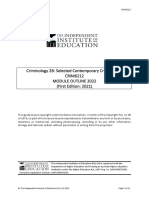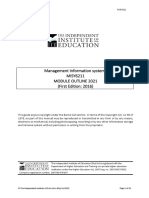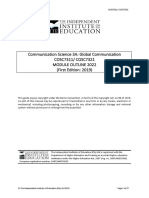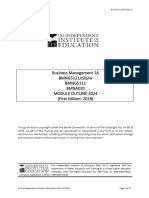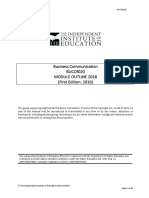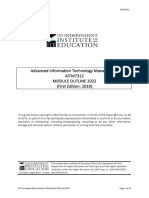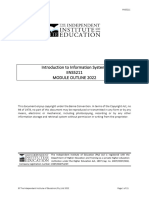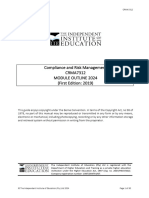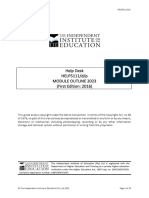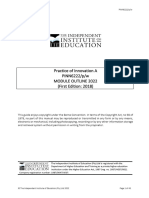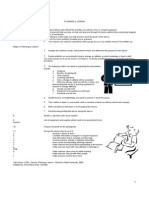Professional Documents
Culture Documents
CDLT6211 Mo
CDLT6211 Mo
Uploaded by
Camille KennethOriginal Title
Copyright
Available Formats
Share this document
Did you find this document useful?
Is this content inappropriate?
Report this DocumentCopyright:
Available Formats
CDLT6211 Mo
CDLT6211 Mo
Uploaded by
Camille KennethCopyright:
Available Formats
IIE Learn Module Outline CDLT6211
Child Development
CDLT6211
MODULE OUTLINE 2022
(First Edition: 2018)
This guide enjoys copyright under the Berne Convention. In terms of the Copyright Act, no 98 of
1978, no part of this manual may be reproduced or transmitted in any form or by any means,
electronic or mechanical, including photocopying, recording or by any other information storage
and retrieval system without permission in writing from the proprietor.
The Independent Institute of Education (Pty) Ltd is registered with the
Department of Higher Education and Training as a private higher education
institution under the Higher Education Act, 1997 (reg. no. 2007/HE07/002).
Company registration number: 1987/004754/07.
© The Independent Institute of Education (Pty) Ltd 2022 Page 1 of 27
IIE Learn Module Outline CDLT6211
Table of Contents
Introduction.............................................................................................................................................. 3
Using this Module Outline ..................................................................................................................... 4
This Module on Learn ............................................................................................................................. 5
Icons Used in this Document and on Learn ......................................................................................... 6
Module Resources ................................................................................................................................... 7
Module Purpose ...................................................................................................................................... 8
Module Outcomes ................................................................................................................................... 8
Assessments ............................................................................................................................................. 9
Module Pacer ......................................................................................................................................... 12
Glossary of Key Terms for this Module .............................................................................................. 27
© The Independent Institute of Education (Pty) Ltd 2022 Page 2 of 27
IIE Learn Module Outline CDLT6211
Introduction
In this module, the aims are to provide an introduction to the field of developmental psychology.
The module is designed to prepare students who will work with young children in the home,
school, or other professional settings.
Human development is a continuous process that takes place throughout the human life cycle.
In this module, we will study the complex process of changes and establishment of skills that are
mastered, as the individual journeys from conception through to adolescence. We will explore a
variety of research studies and the key theorists who have attempted to explain how the child
moves from complete dependence upon their parents: biologically, cognitively, emotionally and
socially; to a stage of interdependence as the child begins to explore the socio-cultural world
and finally; to a stage of more independence in which adolescents begins to express themselves
as unique individuals preparing to meet the demands and challenges of the adult world.
We will begin our learning with a definition of child development and then progress to how
research is conducted in the field. We will then meet the key theorists who have studied and
researched children in the 20th and 21st century: Freud, Erikson, Pavlov, Skinner, Watson, Piaget
Vygotsky and Bronfenbrenner. These theories will introduce us to the four major approaches to
child development: psychodynamic, biological, behaviourist and cognitive development. Next,
we will explore the development of the child across five stages: prenatal, infancy, early childhood,
middle childhood and adolescence. We will gain an in-depth understanding of the sequences,
stages and processes that govern the appearance and maturation of children’s biological
structures, psychological traits, language skills, cognitive processing and social behaviour as they
adapt to their socio-cultural contexts.
The module will briefly introduce you to the optimistic and more recent research work of
cognitive psychologist Dr Reuven Feuerstein. We will conclude by looking at the importance of
career development learning for children in the South African setting and consider some of the
challenges and health hazards that may impede and hamper the optimal development for all
children in our country, South Africa.
Our hope is that the module will inspire you to use the knowledge gained by not only improving
the quality of your interactions with the children and school learners you come into contact with,
but that you will gain insight into your own personal childhood development path and that the
module will perhaps even prepare you for the journey with your own children that you might
parent one day.
© The Independent Institute of Education (Pty) Ltd 2022 Page 3 of 27
IIE Learn Module Outline CDLT6211
Using this Module Outline
This module outline has been developed to support your learning. Please note that the
content of this module is on Learn as well as in the prescribed material. You will not succeed
in this module if you focus on this document alone.
• This document does not reflect all the content on Learn, the links to different resources,
nor the specific instructions for the group and individual activities.
• Your lecturer will decide when activities are available/open for submission and when these
submissions or contributions are due. Ensure that you take note of announcements made
during lectures and/or posted within Learn in this regard.
© The Independent Institute of Education (Pty) Ltd 2022 Page 4 of 27
IIE Learn Module Outline CDLT6211
This Module on Learn
Learn is an online space, designed to support and maximise your learning in an active manner.
Its main purpose is to guide and pace you through the module. In addition to the information
provided in this document, you will find the following when you access Learn:
• An assessment brief;
• A list of prescribed material;
• A variety of additional online resources (articles, videos, audio, interactive graphics, etc.)
in each learning unit that will further help to explain theoretical concepts;
• Critical questions to guide you through the module’s objectives;
• Collaborative and individual activities (all of which are gradable) with time-on-task
estimates to assist you in managing your time around these;
• Revision questions, or references to revision questions, after each learning unit.
Kindly note:
• Unless you are completing this as a distance module, Learn does not replace your
contact time with your lecturers and/or tutors.
• CDLT6211 is a Learn module, and as such, you are required to engage extensively
with the content on the Learn platform. Effective use of this tool will provide you
with opportunities to discuss, debate, and consolidate your understanding of the
content presented in this module.
• You are expected to work through the learning units on Learn in your own time –
especially before class. Any contact sessions will therefore be used to raise and
address any questions or interesting points with your lecturer, and not to cover every
aspect of this module.
• Your lecturer will communicate submission dates for specific activities in class and/or
on Learn.
© The Independent Institute of Education (Pty) Ltd 2022 Page 5 of 27
IIE Learn Module Outline CDLT6211
Icons Used in this Document and on Learn
The following icons are used in all your modules on Learn:
Icon Description
A list of what you should be able to do after working through the
learning unit.
Specific references to sections in the prescribed work.
Questions to help you recognise or think about theoretical concepts to
be covered.
Sections where you get to grapple with the content/theory. This is
mainly presented in the form of questions which focus your attention
and are aimed at helping you to understand the content better. You
will be presented with online resources to work through (in addition to
the textbook or manual references) and find some of the answers to
the questions posed.
Opportunities to make connections between different chunks of
theory in the module or to real life.
Real life or world of work information or examples of application of
theory, using online resources for self-exploration.
You need to log onto Learn to:
• Access online resources such as articles, interactive graphics,
explanations, video clips, etc. which will assist you in mastering
the content; and
• View instructions and submit or post your contributions to
individual or group activities which are managed and tracked on
Learn.
© The Independent Institute of Education (Pty) Ltd 2022 Page 6 of 27
IIE Learn Module Outline CDLT6211
Module Resources
Prescribed Material (PM) for Hardman, J. 2016. Child and adolescent development: A
this Module South African Socio-Cultural Perspective. 2nd ed. Cape Town:
Oxford University Press Southern Africa.
ISBN:978 019 9048809
Recommended Readings, Please note that several additional resources and links to
Digital, and Web Resources resources are provided throughout this module on the
Learn platform. You are encouraged to engage with these as
they will assist you in mastering the various objectives of
this module. They may also be useful resources for
completing any assignments. You will not, however, be
assessed under examination conditions on any additional or
recommended reading material.
Throughout your Learn module, additional titles, video clips
and website articles that provide information related to this
module are recommended as additional resources.
Module Overview You will find an overview of this module on Learn under the
Module Information link in the Course Menu.
Assessments Find more information on this module’s assessments in this
document and on the Student Portal.
© The Independent Institute of Education (Pty) Ltd 2022 Page 7 of 27
IIE Learn Module Outline CDLT6211
Module Purpose
The purpose of this module is to develop students’ knowledge and understanding of
theories, principles and practices relating to child development, learning and motivation and
how to apply this information to classroom teaching, with a focus on early childhood
through to adolescence.
Module Outcomes
MO1 Demonstrate knowledge and understanding of teaching and learning theories.
Discuss relevant concepts, processes and issues in the development of learning in
MO2
children.
Evaluate developmental characteristics and theories of development from birth
MO3
to adolescence.
Apply different teaching and learning theories to specific contexts in the
MO4
classroom.
© The Independent Institute of Education (Pty) Ltd 2022 Page 8 of 27
IIE Learn Module Outline CDLT6211
Assessments
Integrated Curriculum Engagement (ICE)
Minimum number of ICE activities to complete 4
Weighting towards the final module mark 10%
Formative Take-home Test Assignment
Weighting 25% 30%
Duration (Marks) 1 hour (21 hours to submit) (60 Approximately 10 hours
marks)
Learning Units covered LU1 - LU5 LU1 - LU3
Resources required Prescribed Material Additional research required
Summative Take-home Examination
Weighting 35%
Duration 2 hours (21 hours to submit)
Total marks 120 marks
Open/Closed book Open book
Learning Units covered All
© The Independent Institute of Education (Pty) Ltd 2022 Page 9 of 27
IIE Learn Module Outline CDLT6211
Assessment Preparation Guidelines
Format of the Assessment Preparation Hints
Test
The test for this module will • Ensure that you work through all the relevant
assess Learning Units 1-3 and will activities, exercises and revision questions on
include both short and medium- VCLearn and in your textbook.
length questions, as well as one • Brainstorm possible questions based on the
longer question. You will be learning outcomes and objectives provided. Then
expected to apply, as well as to complete these as practise-tests.
recall information as per your • During both your preparation for the test and
objectives for these learning units. during the test itself, pay attention to the
As such, remember to focus on instruction words (like list, apply, describe etc.)
your learning unit objectives when and to the mark allocations of each question to
preparing for class and when ensure that you are able to provide the correct
studying. depth and detail in your answers.
• Make sure that you have mastered all of the
objectives in Learning Units 1, 2 and 3.
Format of the Assessment Preparation Hints
Assignment
The assignment will test your • You will need a minimum of three additional
ability to understand, integrate sources in order to complete the assignment
and apply the content in Learning effectively. If you do not have Internet access at
Units 1- 5 of this module. home, please ensure that you book time at your
campus resource centre or computer lab to
research and complete your assignment.
Examination
The examination will assess all • Ensure that you work through all the activities,
learning units in this module, and exercises and revision questions on VCLearn and
will include both theory and in your textbook.
application-type questions. • Consult your examination brief for this module,
which will be made available approximately three
You will need to be able to answer weeks prior to your examination. Make sure that
short, medium, and long you practise answering the sample questions in
questions (including one short this brief so that you become familiar with the
essay-type question). kinds of questions likely to appear in the
examination itself.
• Pay close attention to the instruction words (like
list, apply, describe etc.) and to the mark
allocations of each question to ensure that you
© The Independent Institute of Education (Pty) Ltd 2022 Page 10 of 27
IIE Learn Module Outline CDLT6211
provide the correct depth and detail in your
answers.
• Make sure that you can answer all the objectives
for all learning units.
• Brainstorm possible questions based on the
learning outcomes and objectives provided
© The Independent Institute of Education (Pty) Ltd 2022 Page 11 of 27
IIE Learn Module Outline CDLT6211
Module Pacer
Code Programme Contact Sessions Credits
CDLT6211 BEF2; BEI2 36 contact + 4 learn 12
Learning Unit 1 An Introduction to Developmental Psychology
Overview:
This learning unit introduces you to the field of developmental psychology. Some of the
debates central to developmental psychology will be highlighted: nature vs nurture;
universality vs socio-cultural context; continuity vs discontinuity; plasticity: sensitive vs
critical periods and rationalism vs empiricism.
We also consider the importance of having knowledge and understanding in the field of child
development and discuss the history of ideas that inform the different developmental
schools, focussing on innate capacity versus tabula rasa. The learning unit concludes with the
various types of research design used in the field of child development.
If you are a contact student, you will likely spend six sessions on this learning unit.
Please work through Themes 1, 2, 3 and 4 on Learn, together with the relevant sections of
your prescribed source/s. To ensure that you are working towards mastering the objectives
for this learning unit, please also ensure that you complete the activities on Learn.
The challenge you may experience in this learning unit relates to empiricism vs rationalism,
so ensure that you are familiar with the history and the different approach of each school of
thought towards developmental psychology.
© The Independent Institute of Education (Pty) Ltd 2022 Page 12 of 27
IIE Learn Module Outline CDLT6211
Learning Unit 1: Theme Breakdown
Sessions: Theme 1: General Orientation (What is Prescribed Material (PM)
1-6 developmental Psychology)
Related LO1: Provide a concise explanation of the PM1: Chapter 1
Outcomes: field of developmental psychology.
MO001 LO2: Explain the roles of nature and
MO004 nurture in child development.
LO3: Give an example to demonstrate
both continuity and discontinuity in
child development.
LO4: Discuss the role of universality and
socio-cultural context in
development.
Theme 2: Why study child development? PM1: Chapter 1
LO5: Explain the importance of having
knowledge and understanding in the
field of child development.
Theme 3: Innate Capacity versus Tabula PM1: Chapter 1
Rasa (Empiricism vs Rationalism)
LO6: Discuss the history of ideas (innate
capacity versus tabula rasa) that
inform the different developmental
schools.
Theme 4: Research methods in PM: Chapter 1
developmental theory
LO7: Describe the various types of
research design used in the field of
child development.
© The Independent Institute of Education (Pty) Ltd 2022 Page 13 of 27
IIE Learn Module Outline CDLT6211
Learning Unit 2 Theories of Development
Overview:
In this learning unit, we explore the four key approaches to developmental psychology and
the key theories that form the foundation of child development namely the Biological,
Psychodynamic (Freud and Erikson). Behaviourist (Pavlov, Watson and Skinner), Cognitive
(Piaget) and Socio-cultural approach (Vygotsky and Bronfenbrenner).
If you are a contact student, you will likely spend six sessions on this learning unit.
Please work through Themes 1, 2, 3 and 4 on Learn, together with the relevant sections of
your prescribed source/s. To ensure that you are working towards mastering the objectives
for this learning unit, please complete the activities on Learn.
The challenge you may experience in this learning unit relates to understanding the four
theoretical approaches, as such it is imperative that you study these in detail and ensure that
you are able to distinguish between them.
© The Independent Institute of Education (Pty) Ltd 2022 Page 14 of 27
IIE Learn Module Outline CDLT6211
Learning Unit 2: Theme Breakdown
Sessions: Theme 1: General Orientation (Theories of Prescribed Material (PM)
7 - 12 development)
Related LO1: Briefly describe the focus of the four PM: Chapter 2
Outcomes: theoretical perspectives of child
MO001 development.
MO002 LO2: Give an example to demonstrate the
MO003 focus of the four theoretical
MO004 perspectives of child development.
Theme 2: Psychodynamic views PM: Chapter 2
LO3: Discuss the psychodynamic views of
Freud.
LO4: Explain the first five stages of
Erikson’s theory.
Theme 3: The Behaviourist paradigm PM: Chapter 2
LO5: Explain the process of classical
conditioning using an example.
LO6: Using an example, explain how
operant conditioning could be used
in the classroom setting.
Theme 4: Cognitive Development and PM: Chapter 2
Learning
LO7: Discuss cognitive development and
learning theory of Piaget by using
examples.
LO8: Discuss Vygotsky’s socio-cultural
theory with special reference to the
concepts of mediation and zone of
proximal development (ZPD).
LO9: Explain why Vygotsky’s theory (ZPD)
is pertinent when studying child
development in the South African
setting.
LO10: Explain why Bronfenbrenner’s
theory is pertinent when studying
child development in the South
African setting.
© The Independent Institute of Education (Pty) Ltd 2022 Page 15 of 27
IIE Learn Module Outline CDLT6211
Learning Unit 3 Stages of Development: Prenatal
Overview:
This learning unit provides a broad overview of prenatal development. Foetal behavioural
states, as well as the sensory development of the foetus through the prenatal
developmental period is discussed as well as reflex responses. Threats to a healthy
pregnancy are explored in terms of environmental and teratogenic factors and their specific
health risks to the foetus.
Note: Since you have been introduced to some of the core concepts in previous modules
(PSYC5111/ PSYC5112) this learning unit will not necessarily cover all aspects within this
chapter. However, it might be a good idea to at least read through the whole chapter to
refresh your memory.
If you are a contact student, you will likely spend four sessions on this learning unit.
Please work through Themes 1, 2, 3 and 4 on Learn, together with the relevant sections of
your prescribed source/s. To ensure that you are working towards mastering the objectives
for this learning unit, please complete the activities on Learn.
We do not expect that you would find any information particularly challenging in this
learning unit. However, it is important that you carefully go through the section indicated
and that you are able to meet the objectives in this learning unit.
© The Independent Institute of Education (Pty) Ltd 2022 Page 16 of 27
IIE Learn Module Outline CDLT6211
Learning Unit 3: Theme Breakdown
Sessions: Theme 1: Behaviour of the foetus Prescribed Material (PM)
13 - 16
Related LO1: Explain the four behavioural states of PM: Chapter 3
Outcomes: the foetus. (pp.77-84)
MO001 Theme 2: Foetal senses PM: Chapter 3
MO002 LO2: Draw a table that explains at what
MO003 stage the foetus can: hear, smell,
MO004 feel pain, feel touch, see, habituate,
practise foetal breathing. (pp.79-82)
Theme 3: Risks for the foetus PM: Chapter 3
LO3: Explain why maternal stress and
anxiety are risks for a foetus. (pp.70-
77)
Theme 4: New-born Reflexes PM: Chapter 3
LO4: Tabulate and explain the eight baby
reflexes with corresponding time
periods. (pp.86-88)
© The Independent Institute of Education (Pty) Ltd 2022 Page 17 of 27
IIE Learn Module Outline CDLT6211
Learning Unit 4 Stages of Development: Infancy
Overview:
This learning unit focusses on the development that occurs during infancy. We explore
Piaget’s sensorimotor cognitive stage of development, as well as early memory and the role
of parents in infant cognitive development. The development of language in the infant is
discussed and then the reciprocal engagement between child and caregiver is highlighted as
essential for both optimal cognitive and psychosocial functioning.
If you are a contact student, you will likely spend six sessions on this learning unit.
Please work through Themes 1, 2, 3 and 4 on Learn, together with the relevant sections of
your prescribed source/s. To ensure that you are working towards mastering the objectives
for this learning unit, please complete the activities on Learn.
The major challenges of studying this stage of development is the speed at which
development occurs, particularly during the first two years after birth. As such, keep careful
track of how the infant’s body and mind developments and grows during this period.
© The Independent Institute of Education (Pty) Ltd 2022 Page 18 of 27
IIE Learn Module Outline CDLT6211
Learning Unit 4: Theme Breakdown
Sessions: Theme 1: Cognitive development Prescribed Material (PM)
17 - 22
Related LO1: Summarise the major cognitive PM: Chapter 4
Outcomes: development in the first stage of
MO001 Piaget’s cognitive development
MO002 theory.
MO003 LO2: Describe the “A not B error” in as per
MO004 Piaget’s cognitive development
theory.
LO3: Identify a point of critique of Piaget’s
explanation of the sensorimotor
stage.
LO4: Explain the infant related concept
demonstrated in the experiment of
Rovee-Collier.
Theme 2: Social interaction and cognitive PM: Chapter 4
development
LO5: Explain the role of parents in infant
cognitive development using
Bruner’s concept of “scaffolding.
Theme 3: Language Development PM: Chapter 4
LO6: Tabulate the language development
of the infant in the first two years of
development.
LO7: Describe the environment of
language learning.
LO8: Briefly explain Chomsky’s theory of
language development.
Theme 4: Psychosocial development PM: Chapter 4
LO9: Discuss the critique of the three
temperamental categories.
LO10: Provide the alternative explanations
of temperament.
LO11: Explain the patterns of attachment
identified through Bowlby’s
research.
LO11: Discuss the importance of the early
child-caregiver relationship.
© The Independent Institute of Education (Pty) Ltd 2022 Page 19 of 27
IIE Learn Module Outline CDLT6211
Learning Unit 5 Stages of Development: Early Childhood
Overview:
This learning unit explores the cognitive and moral development of children between the
ages of two and eight years. We highlight the importance of play in cognitive development
and the importance of children mastering the ability to self-regulate. We investigate
symbolic functioning as we explore Piaget’s pre-operational thought stage, followed by an
explanation of Kohlberg’s theory of moral development and the child’s capability for moral
reasoning and empathic expression. Finally, we consider how teachers could increase
empathy in the child during the early childhood development stage.
If you are a contact student, you will likely spend five sessions on this learning unit.
Please work through Themes 1, 2, 3 and 4 on Learn, together with the relevant sections of
your prescribed source/s. To ensure that you are working towards mastering the objectives
for this learning unit, please complete the activities on Learn.
The challenge you may experience in this learning unit relates to understanding early
childhood and the issues facing development in this developmental period. The core
development theorists are focussed on to enable you to understand. As such, make sure you
know and understand the theories.
© The Independent Institute of Education (Pty) Ltd 2022 Page 20 of 27
IIE Learn Module Outline CDLT6211
Learning Unit 5: Theme Breakdown
Sessions: Theme 1: Cognitive development in early Prescribed Material (PM)
23 - 27 childhood
LO1: Summarise the major cognitive PM: Chapter 5
Related developments in the second stage of
Outcomes: Piaget’s cognitive development
MO001 theory.
MO002 LO2: Explain why not all children will be in
MO003 the pre-operational stage during
MO004 early childhood.
LO3: Explain what is meant when we say a
child is able to ‘decentre’.
LO4: Explain the link between the ability
to ‘decentre’ and egocentricism.
Theme 2: Play as a leading activity PM: Chapter 5
LO5: Explain how ‘play’ assists in the
development of the ability of self-
regulation in early childhood.
Theme 3: Moral Development in Children PM: Chapter 5
LO6: Discuss the six stages of Kohlberg’s
theory.
LO7: Explain why Kohlberg’s theory
cannot be universally applied to all
children in South Africa.
Theme 4: Developing empathy in children PM: Chapter 5
LO8: Briefly describe how teachers could
increase empathy in the child in the
early childhood development stage.
© The Independent Institute of Education (Pty) Ltd 2022 Page 21 of 27
IIE Learn Module Outline CDLT6211
Learning Unit 6 Stages of Development: Middle Childhood
Overview:
This learning unit explores the cognitive development in the middle childhood years
(approximately 7 – 11 years of age). Firstly, we will look at the concrete operational skills.
Next, we explore the changes that occur in memory during this age as well as other cognitive
skills. We will also look at the important role that the correct school has on cognitive
development. Thereafter, we focus on the negative impact of bullying and consider some
steps that we can take to prevent bullying of children. Lastly, we examine the impact of
family structure, siblings, peers and friends in establishing a sense of ‘self’ and self-esteem.
If you are a contact student, you will likely spend five sessions on this learning unit.
Please work through Themes 1 to 5 on Learn, together with the relevant sections of your
prescribed source/s. To ensure that you are working towards mastering the objectives for
this learning unit, please complete the activities on Learn.
The challenge you may experience in this learning unit relates to understanding how new
contexts of development stimulate cognitive and social development further together with
its influence on how children think about themselves.
© The Independent Institute of Education (Pty) Ltd 2022 Page 22 of 27
IIE Learn Module Outline CDLT6211
Learning Unit 6: Theme Breakdown
Sessions: Theme 1: Cognitive development Prescribed Material (PM)
28 - 32
Related LO1: Summarise the major cognitive PM: Chapter 6
Outcomes: development events that take place
MO001 in the third stage of Piaget’s
MO002 cognitive development theory.
MO003 LO2: Explain the changes that occur in
memory during the middle
childhood years.
LO3: Identify other cognitive
developments that take place during
middle childhood.
Theme 2: School, Parents, Siblings and PM: Chapter 6
Peers
LO4: Outline the effect the school setting
has on cognitive development.
LO5: Describe the influence of family
structure, parents, siblings and
peers on development during the
middle childhood years.
Theme 3: Bullying PM: Chapter 6
LO6: Explain why some children are more
likely to bully than others.
LO7: Outline the effects of bullying on the
child and what can be done to stop
bullying between children at school.
Theme 4: Moral development PM: Chapter 6
LO8: Briefly highlight the points of critique
of Kohlberg’s moral theory of
development.
Theme 5: A new sense of “self” PM: Chapter 6
LO9: Discuss the development of the
child’s self- concept and self-esteem.
© The Independent Institute of Education (Pty) Ltd 2022 Page 23 of 27
IIE Learn Module Outline CDLT6211
Learning Unit 7 Stages of Development: Adolescence
Overview:
This learning unit begins by outlining the final stage of Piaget’s cognitive development
stages. We consider the influence of school, parents, family and peers, explore the different
types of friendship and relationships that the adolescent establishes during this time and the
impact of such relationships on their self-esteem. We also explore Selman’s Social
Perspective theory as an alternative way to consider moral development. Finally, we discuss
Marcia’s theory of Identity Formation which provides more detail on the challenges that the
adolescent faces in attempting to establish their identity and sense of ‘self’ in the world.
If you are a contact student, you will likely spend four sessions on this learning unit.
Please work through Themes 1 to 5 on Learn, together with the relevant sections of your
prescribed source/s. To ensure that you are working towards mastering the objectives for
this learning unit, please complete the activities on Learn.
The challenge you may experience in this learning unit relates to the cognitive development
of the adolescent. Make sure you understand the cognitive development theories in detail.
© The Independent Institute of Education (Pty) Ltd 2022 Page 24 of 27
IIE Learn Module Outline CDLT6211
Learning Unit 7: Theme Breakdown
Sessions: Theme 1: Cognitive development in Prescribed Material (PM)
33 - 36 adolescence
Related LO1: Summarise the major cognitive PM: Chapter 7
Outcomes: developments in the fourth and final
MO001 stage of Piaget’s cognitive
MO002 development theory.
MO003 Theme 2: Schooling PM: Chapter 7
MO004 LO2: Explain the effect the school
environment could have on an
adolescent’s cognitive development.
Theme 3: Parents, Peers, Friends and PM: Chapter 7
Romance
LO3: Describe the changes that can occur
in the parent-adolescent
relationship.
LO4: Describe the types of friendships and
the role that peers and friends play
during the adolescent years.
LO5: Identify sexual risks facing the
adolescent in the South African
setting.
Theme 4: Moral development PM: Chapter 7
LO6: Discuss the four stages of Selman’s
social-perspective taking theory.
Theme 5: Development of the self PM: Chapter 7
LO7: Discuss the development of the
adolescents’ self- concept and self-
esteem.
LO8: Explain the different identity
formation statuses outlined by
Marcia.
© The Independent Institute of Education (Pty) Ltd 2022 Page 25 of 27
IIE Learn Module Outline CDLT6211
Learning Unit 8 Health Barriers to Child Development
Overview:
This learning unit focuses on the health barriers that could impede optimal cognitive and
scholastic development in primary and high school children in the South African context. We
also consider factors related to gender that might impact cognitive and scholastic
development in the South African context.
If you are a contact student, you will likely spend four sessions on this learning unit.
Please work through Themes 1, 2 and 3 on Learn, together with the relevant sections of your
prescribed source/s. To ensure that you are working towards mastering the objectives for
this learning unit, please complete the activities on Learn.
The challenge you may experience in this learning unit relates to understanding the affect a
problem in one area of development may have on the functioning of other domains,
ultimately affecting the child in his or her entirety.
© The Independent Institute of Education (Pty) Ltd 2022 Page 26 of 27
IIE Learn Module Outline CDLT6211
Learning Unit 7: Theme Breakdown
Sessions: Theme 1: Barriers to learning Prescribed Material (PM)
37 - 40
Related LO1: List the five barriers to learning. PM: Chapter 11
Outcomes: Theme 2: Health Barriers to learning PM: Chapter 11
MO001 LO2: Discuss the health barriers that may
MO002 impede the optimal scholastic and
MO003 cognitive development of school
MO004 children in a South African context.
Theme 3: Health barriers caused by socio- PM: Chapter 11
economic factors
LO3: Discuss health barriers caused by
cultural and socio-economic factors
that impede the optimal scholastic
and cognitive learning and
development of school children in a
South African context.
LO4: Explain factors related to gender that
might impact the sub-optimal
cognitive and scholastic
development of children in a South
African context.
Glossary of Key Terms for this Module
See page 361 to 372 of Prescribed textbook.
© The Independent Institute of Education (Pty) Ltd 2022 Page 27 of 27
You might also like
- Applied Inquiries, Investigations and ImmersionsDocument220 pagesApplied Inquiries, Investigations and ImmersionsJohn Ambas90% (251)
- Satisfaction - A Behavioral Perspective On The ConsumerDocument216 pagesSatisfaction - A Behavioral Perspective On The ConsumerIsabelly Vieira0% (1)
- Psed5112 MoDocument25 pagesPsed5112 MoclarisemoodNo ratings yet
- Losa6212 MoDocument29 pagesLosa6212 Momsalleha40No ratings yet
- Learn Module Outline 2021Document36 pagesLearn Module Outline 2021Tiaan VorsterNo ratings yet
- Learn Module OutlineDocument22 pagesLearn Module OutlineamberleeNo ratings yet
- Learn Module OutlineDocument22 pagesLearn Module OutlineEden JalesNo ratings yet
- FDSL5122 MoDocument24 pagesFDSL5122 MoJulieanna MarcolongoNo ratings yet
- Laes5111 MoDocument39 pagesLaes5111 MoarronyeagarNo ratings yet
- Buel6212 MoDocument44 pagesBuel6212 Momsalleha40No ratings yet
- Crim6212 MoDocument19 pagesCrim6212 MoJulieanna MarcolongoNo ratings yet
- Learn Module OutlineDocument29 pagesLearn Module OutlinePanashe Floyd SedeyaNo ratings yet
- Learn Module OutlineDocument37 pagesLearn Module Outlinedaniella george van wykNo ratings yet
- Lade7111 MoDocument34 pagesLade7111 Molishanyapillay1No ratings yet
- Communication Science 3A: Global Communication COSC7311/ COSC7321 Module Outline 2022 (First Edition: 2019)Document27 pagesCommunication Science 3A: Global Communication COSC7311/ COSC7321 Module Outline 2022 (First Edition: 2019)Lerushka PadayacheeNo ratings yet
- Lein5112 MoDocument22 pagesLein5112 Mobradleyvanrensburg06No ratings yet
- Psyc5121 MoDocument23 pagesPsyc5121 Mobradleyvanrensburg06No ratings yet
- Psyc5122 MoDocument25 pagesPsyc5122 MoNatasha CarstensNo ratings yet
- Beat6112 MoDocument35 pagesBeat6112 MoNdumiso MsizaNo ratings yet
- FDBS7111p MODocument22 pagesFDBS7111p MOAnnie NaickerNo ratings yet
- Bmng5121 MoDocument37 pagesBmng5121 MoeremiakapeemNo ratings yet
- Fiac6211 MoDocument31 pagesFiac6211 MoPanashe SimbiNo ratings yet
- Spde7111 MoDocument18 pagesSpde7111 Molithakazi01No ratings yet
- Module OutlineDocument27 pagesModule Outlinebw929518No ratings yet
- Learn Module OutlineDocument30 pagesLearn Module Outlinepillaynorman20No ratings yet
- SPEC7111w MODocument32 pagesSPEC7111w MOICT ASSIGNMENTS MZANSINo ratings yet
- Laes7411 MoDocument46 pagesLaes7411 Mobongiweyeko60No ratings yet
- Lscm5121 MoDocument26 pagesLscm5121 Moorenthal12jamesNo ratings yet
- Ictc6212 MoDocument23 pagesIctc6212 MoCamille KennethNo ratings yet
- LOPF5111 Learn Module Outline PDFDocument44 pagesLOPF5111 Learn Module Outline PDFShriya ParsadNo ratings yet
- Foed7411 - Module ReaderDocument22 pagesFoed7411 - Module ReadernangamsoNo ratings yet
- Acbp5122 MoDocument32 pagesAcbp5122 MoNonjabulo Lethukuthula Ayanda MaphangaNo ratings yet
- InfoDocument20 pagesInfoBrilliantNo ratings yet
- Sftl7111 MoDocument21 pagesSftl7111 Molithakazi01No ratings yet
- Learn Module OutlineDocument26 pagesLearn Module OutlineBrilliantNo ratings yet
- Mfac6211 MoDocument36 pagesMfac6211 MoarronyeagarNo ratings yet
- Aitm7312 MoDocument29 pagesAitm7312 Mokgahlisomahlaku2No ratings yet
- Module OutlineDocument23 pagesModule Outlinemuhammed shaheed IsaacsNo ratings yet
- Iins5211 MoDocument21 pagesIins5211 MoarronyeagarNo ratings yet
- Incl7112 MoDocument21 pagesIncl7112 MoAnnie NaickerNo ratings yet
- Laes5111 MoDocument39 pagesLaes5111 MoarronyeagarNo ratings yet
- Crma7312 MoDocument30 pagesCrma7312 Moamahlekunene00No ratings yet
- Acbp5121 MoDocument39 pagesAcbp5121 MoandreNo ratings yet
- PMAC5112w MODocument36 pagesPMAC5112w MOAmmarah RamnarainNo ratings yet
- Taxl8412 MoDocument40 pagesTaxl8412 MotarahnamNo ratings yet
- Help5111 MoDocument29 pagesHelp5111 MozamakhwezimathonsiNo ratings yet
- Mace5112 MoDocument32 pagesMace5112 MoThabangNo ratings yet
- Taxa7311 MoDocument36 pagesTaxa7311 Motaniel.dhaverNo ratings yet
- Publ6212 MoDocument43 pagesPubl6212 MoJulieanna MarcolongoNo ratings yet
- BMNG6221w - Module OutlineDocument38 pagesBMNG6221w - Module OutlineGuAp hustlersNo ratings yet
- Enfl6111 MoDocument16 pagesEnfl6111 Molishanyapillay1No ratings yet
- SPCM7321 - Mo 2Document28 pagesSPCM7321 - Mo 2ethanjovanhodgespillayNo ratings yet
- Iner7411 MoDocument30 pagesIner7411 Mozmagadla0808No ratings yet
- Laco7312 MoDocument36 pagesLaco7312 Mobennet3yiseNo ratings yet
- Lain7312 MoDocument31 pagesLain7312 Motash.dorasamy1971No ratings yet
- Llaw7321 MoDocument37 pagesLlaw7321 MohontoskokoNo ratings yet
- Inpa6212 MoDocument31 pagesInpa6212 Molishanyapillay1No ratings yet
- Laco6311 MoDocument37 pagesLaco6311 Molumteto18No ratings yet
- SPDL7111w MODocument23 pagesSPDL7111w MOIlhaam KhanNo ratings yet
- Module OutlinesDocument45 pagesModule OutlinesSkye AllanNo ratings yet
- Information Technology: NVEQ Level 2 Class X IT203-NQ2012-Word Processing (Intermediate)Document42 pagesInformation Technology: NVEQ Level 2 Class X IT203-NQ2012-Word Processing (Intermediate)DivyanshuNo ratings yet
- Substance Use Stages of ChangeDocument2 pagesSubstance Use Stages of ChangeRiza Zahara100% (1)
- Gerund: 1. Read The Rules and Complete The ExamplesDocument3 pagesGerund: 1. Read The Rules and Complete The ExamplesKimNo ratings yet
- علاقة الثقة التنظيمية والصكت التنظيمي بكل من الولاء التنظيمي و الرضا الوظيفي PDFDocument9 pagesعلاقة الثقة التنظيمية والصكت التنظيمي بكل من الولاء التنظيمي و الرضا الوظيفي PDFAdel MohammedNo ratings yet
- #1 Future Perfect LESSONDocument2 pages#1 Future Perfect LESSONBrianda AguilarNo ratings yet
- GenerativismDocument9 pagesGenerativismnsansaturninoNo ratings yet
- A New Learner-Centered Lesson Plan in Teaching Grammar To Esl-Efl LearnersDocument15 pagesA New Learner-Centered Lesson Plan in Teaching Grammar To Esl-Efl LearnersPribadi HadhiNo ratings yet
- Enhancing The Process Specification For Systematic Literature Reviews ReviewsDocument15 pagesEnhancing The Process Specification For Systematic Literature Reviews ReviewsLUIS MIGUEL CAVERO AVENDANONo ratings yet
- The Simple Past Tense - Regular VerbsDocument3 pagesThe Simple Past Tense - Regular VerbsVandaNo ratings yet
- Ariana McfaddenDocument4 pagesAriana Mcfaddenapi-410367100No ratings yet
- 4h Lesson PlanningDocument3 pages4h Lesson PlanningRosi AriasNo ratings yet
- Tkde2022 BeatganDocument14 pagesTkde2022 Beatganf2022393015No ratings yet
- DIY Activities For Autism - Part 1 PDFDocument2 pagesDIY Activities For Autism - Part 1 PDFseema jaiswalNo ratings yet
- Discipline With DignityDocument292 pagesDiscipline With Dignitysara wilson100% (2)
- English Literature 24 Okt 2020Document3 pagesEnglish Literature 24 Okt 2020Evie FitrianiNo ratings yet
- Lesson Plan Unit 3 Yesterday and Today Grammar (Wednesday)Document4 pagesLesson Plan Unit 3 Yesterday and Today Grammar (Wednesday)Wan Nurul SyazwaniNo ratings yet
- ANNUAL PLAN 3th GRADE (Autoguardado)Document8 pagesANNUAL PLAN 3th GRADE (Autoguardado)tpsjf oidkNo ratings yet
- Lying Checklist: Questions About The Lie HARDER For The Lie Catcher EASIER For The Lie CatcherDocument4 pagesLying Checklist: Questions About The Lie HARDER For The Lie Catcher EASIER For The Lie Catcherlalagabrielle613No ratings yet
- Lesson 11 WritingDocument2 pagesLesson 11 WritingNako AbdullahNo ratings yet
- Semantic NetworksDocument68 pagesSemantic Networkstriveni_pal100% (1)
- User ResearchDocument21 pagesUser Researchfabulous oyedunNo ratings yet
- NI Module 1 IntroductionDocument7 pagesNI Module 1 IntroductionpnlgnkrstnNo ratings yet
- Reading 3 SylabusDocument4 pagesReading 3 SylabusParlindungan PardedeNo ratings yet
- Hackerearth Phase 1 Basic Programming PDFDocument23 pagesHackerearth Phase 1 Basic Programming PDFPawan NaniNo ratings yet
- Forced Into Management British English TeacherDocument10 pagesForced Into Management British English TeacherELENA TINTINo ratings yet
- FS 1 - Episode 5Document4 pagesFS 1 - Episode 5Zaide MangondatoNo ratings yet
- Disciplines and Ideas in The Social ScienceDocument36 pagesDisciplines and Ideas in The Social ScienceKelvin Paul Bamba Panuncio83% (48)
- Cohesion: How To Make Sentences Flow'Document2 pagesCohesion: How To Make Sentences Flow'sghdgudfshjcsNo ratings yet
- Selection-WPS OfficeDocument6 pagesSelection-WPS OfficeRommel Coral MonforteNo ratings yet










